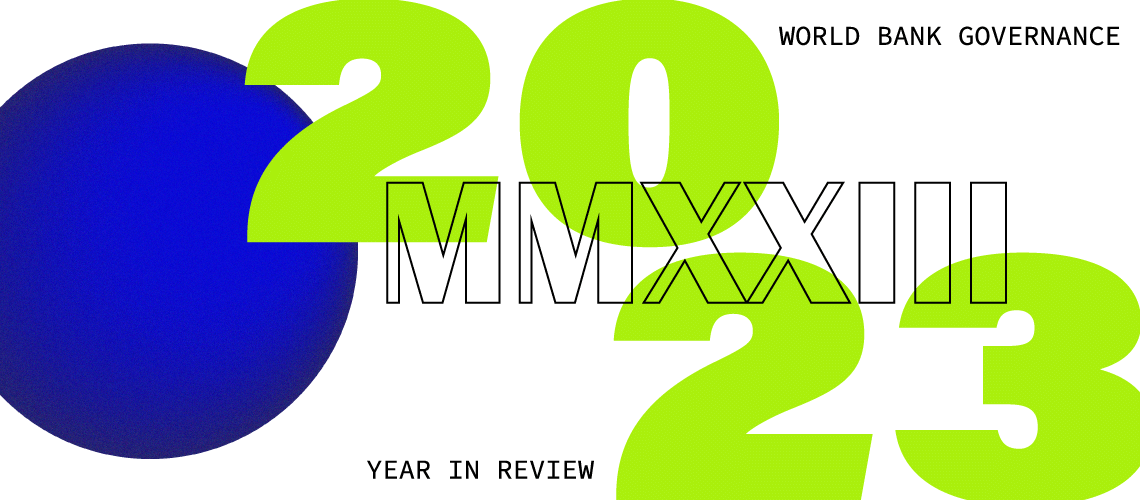 World Bank / 2023
World Bank / 2023
In 2023, the world faced a series of unprecedented challenges and transformative events. Climate change asserted its presence, with compelling urgent calls for environmental action and adaption in response to an increasing frequency of extreme weather continuing. The digital domain continues its rapid evolution, presenting ethical and societal considerations amid advancements in artificial intelligence. Social justice movements gained momentum, amplifying voices and advocating for equity across various sectors.
Despite the challenges, the year unfolded with resilience and innovation emerging as guiding principles in the face of many different challenges. As the year draws to a close, we reflect on the challenges and opportunities that defined the year, realizing that with every obstacle is a chance for growth and positive change. In this blog, we highlight the various projects, initiatives, and programs worked on by the World Bank Governance Global Practice teams this year:
Procurement in the time of crises
Increased counter-cyclical public spending during crises needs a more efficient system of public procurement. This allows expediting expenditures, thus freeing resources that can be used to help people impacted by crises.
Mobilizing for progress: How mobile government can drive development
Mobile phones are helping more and more people connect to the jobs, business opportunities, and services they need to escape poverty. Active broadband subscriptions are increasing fast in all regions of the world, most rapidly in Africa and Asia.
Bridging the gender gaps in GovTech
This International Women’s Day, the UN Commission on the Status of Women will spotlight its main objective—which is, Innovation and technological change, and education in the digital age for achieving gender equality and the empowerment of all women and girls.
Governance in a dynamic world
Governance is about raising resources and putting them to productive and accountable public use. With the recent crises from the pandemic and the war on Ukraine, there is a call for an increased role of government, which requires a more actionable definition of governance.
Corruption in Fragile, Conflict and Violent Settings: False dilemmas and inadequate toolbox?
Corruption is a driver of fragility that undermines sustainable peace and stability. Tackling corruption in fragile, Conflict, and Violent (FCV) contexts requires mobilizing political capital. Therefore, it is crucial to address corruption in FCVs early with appropriate tools.
Empowered women, empowered economies: Financing for gender equality in Latin America and the Caribbean
Despite significant progress in Latin America and the Caribbean (LAC), women in the region continue to face numerous socio-economic disparities, such as limited access to education, healthcare, and economic opportunities.
Seven ways to address corruption risks in climate change
The rate at which climate financing is being mobilized is still vastly insufficient, but it is growing. As money is being scaled up for an area of investments, rent seeking and (attempts) at corruption will inevitably be risks.
Seven ways to increase access to justice in Fragile and Conflict-Affected Settings
Justice systems in countries affected by fragility, conflict, and violence (FCV) face multiple challenges such as lack of independence, corruption, institutional and administrative problems. This blog identifies explains how to increase access to justice in these settings.
What’s in a chart? A history of public sector reforms
How would we like to see the adoption of systems in the public sector, debt management, evolve in the future? More integration of the systems to create efficiencies as information would only need to be collected once but could be shared across parts of government.
How can frayed social contracts in West Africa be mended?
For West Africa, the past few years have brought crises ranging from the impact of COVID-19, armed violence, rising food and fuel prices, and international geopolitical turmoil. Political coups have created a general backsliding of democracy, closing down the civil space.
Data-driven policies to improve management of healthcare workers
Frontline healthcare workers have been essential in the ongoing public health crisis, and their importance and contribution cannot be overstated. However, governments, especially in low-and middle income countries, are confronting rising levels of public debt.
A government productivity revolution requires a government analytics revolution: Introducing The Government Analytics Handbook
In the past decade, the data revolution has transformed productivity in the private sector. The management of private firms is increasingly informed by data. But what about the public sector? The Government Analytics Handbook is a blueprint for using data.



Join the Conversation